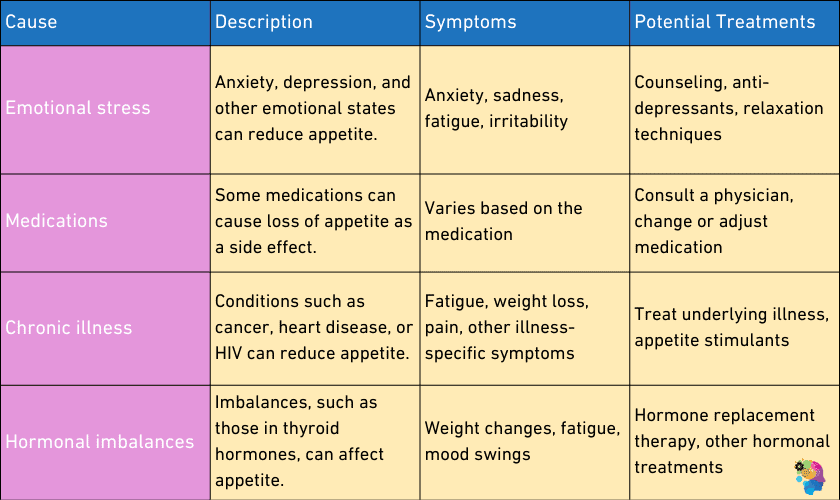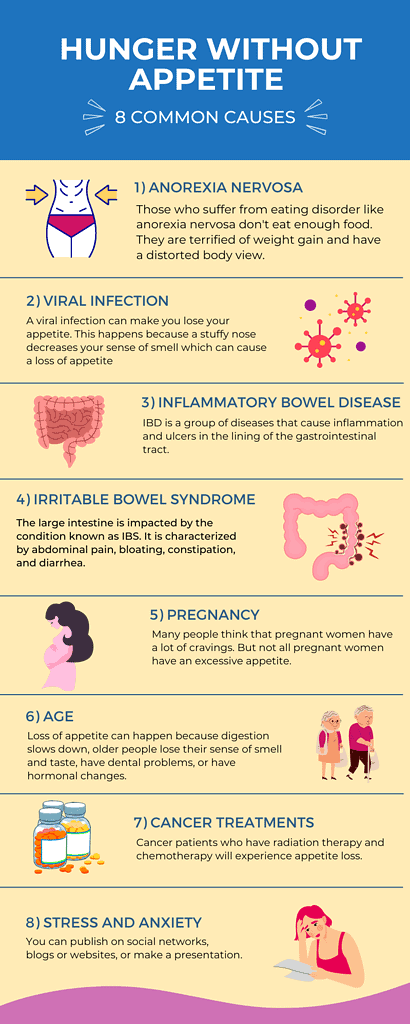In today's fast-paced world, finding moments of mindfulness can be a challenge. Embracing "The Power of Now"...

Appetite loss, also known as anorexia (not to be confused with anorexia nervosa, an eating disorder), is a decrease or lack of desire to eat.
- Illness
- Medications
- Mental health issues
- Aging
- Hormonal changes
- Eating disorders
- Substance use
- Fatigue or sleep deprivation
- Poor nutrition
- Overeating or irregular eating habits
- Identify the cause
- Eat smaller, more frequent meals
- Choose nutrient-dense foods
- Make meals enjoyable
- Stay hydrated
- Address emotional factors
- Establish a routine
- Exercise
- Consult with a healthcare professional
- Use appetite-stimulating supplements
The phrase "hungry but no appetite" means that someone feels hungry but does not want to eat. This can be hard because hunger is a basic human need, and being unable to eat can make it tough to do everyday things.
In this blog post, we'll explain the reasons behind your loss of appetite and how to cope with appetite loss.

Hunger without appetite can be confusing and frustrating. Several factors, including emotional aspects, physical characteristics, and medical conditions, can contribute to this issue.
Stress, anxiety, and depression can all affect your appetite. These emotions can create a sensation of hunger, even when you don't feel like eating. If emotional factors impact your appetite, it might be helpful to talk to a mental health professional or explore an online therapy platform for support.
Dehydration, hormonal changes, and lack of sleep can also lead to hunger without appetite. Maintaining a healthy lifestyle and paying attention to your body's needs are essential to ensure you're not experiencing hunger due to these factors. [1]
Certain medical conditions, such as thyroid problems, gastrointestinal issues, or medication side effects, can cause hunger without appetite. If you suspect a medical issue is affecting your appetite, consult a healthcare professional for a proper diagnosis and treatment plan. [2]

Those who suffer from eating disorder like anorexia nervosa don't eat enough food. They are terrified of weight gain and have a distorted body view. They may also restrict the amount of food they eat, exercise too much, or purge what they eat. [3]
A viral infection can make you lose your appetite. This happens because a stuffy nose decreases your sense of smell which can cause a loss of appetite.
IBD is a group of diseases that cause inflammation and ulcers in the lining of the gastrointestinal tract. This can lead to symptoms such as abdominal pain, diarrhea, rectal bleeding, weight loss, and fatigue. Crohn's disease and ulcerative colitis are two common forms of IBD. [4]
The large intestine is impacted by the condition known as IBS. It is characterized by abdominal pain, bloating, constipation, and diarrhea. [5]
Many people think that pregnant women have a lot of cravings. But not all pregnant women have an excessive appetite. The possible reason could be nausea or morning sickness. [6]
Loss of appetite can happen because digestion slows down, older people lose their sense of smell and taste, have dental problems, or have hormonal changes. If an older person seems to be losing their appetite, it's essential to contact a healthcare provider who specializes in geriatric medicine. [7]
Cancer patients who have radiation therapy and chemotherapy will experience appetite loss. Cancer therapies can make them feel nauseous and sick or change how food smells and tastes. [8]
Your body may release cortisol and other stress hormones when you feel stressed or anxious. These hormones can make you lose interest in food. In addition, stress and anxiety can make it hard to digest food properly and may cause feelings of nausea. [9]
When your red blood cell count is too low, you have anemia. These cells help carry oxygen around your body and are used in respiration and converting food into energy. Anemia can make you feel weak, tired, and without an appetite.
Hormonal imbalances can occur when the hormones leptin and ghrelin are out of balance. This can cause hunger and a mismatched appetite. Certain health conditions, such as polycystic ovary syndrome (PCOS), can cause hormonal imbalances and decreased appetite. [10]
Some medications, especially blood pressure medications, can cause side effects like nausea, making eating challenging. This happens because drugs can change how the body reacts to certain foods.
Digestive issues
In the case of an upset stomach or visiting the bathroom too often, digestive disorders can cause discomfort and stomach pain. When allergic or intolerant to certain foods, it can cause digestive problems causing appetite failure.

If you're experiencing hunger without appetite, there are several strategies to help stimulate your desire to eat:
Creating a pleasant eating atmosphere can help encourage your appetite. Consider these tips:
Incorporate appetite-stimulating foods into your diet, such as:
Mindful eating can help improve your appetite by encouraging you to focus on your body's hunger cues and savor your food. Some techniques include:
Understanding the causes of hunger without appetite and taking proactive steps to stimulate your appetite can help improve your overall well-being. If you suspect that emotional factors contribute to your lack of appetite, consider seeking support from a licensed therapist through a convenient online therapy platform. By addressing the underlying causes and adopting healthy eating habits, you can regain control over your appetite and enjoy a more balanced relationship with food.
Appetite loss can lead to malnutrition, fatigue, and decreased energy levels. Additionally, a lack of appetite can make adhering to a healthy diet challenging, leading to deficiencies in essential nutrients like vitamins and minerals. This can also increase the risk for specific medical conditions caused by low or no vitamins and minerals like heart palpitations, cramps, and a low immune system.
Eating small meals regularly throughout the day might help you to restore your appetite which should be your first choice, but you can also take certain medications to stimulate your appetite if that does not help.
You must be logged in to post a comment.
In today's fast-paced world, finding moments of mindfulness can be a challenge. Embracing "The Power of Now"...
In our fast-paced world, finding moments of tranquility can be a challenge. Meditation apps offer a convenient...
In our fast-paced world, taking time for self-reflection and mindfulness is essential for well-being. Journaling can be...
In today’s fast-paced world, managing stress has become an essential aspect of maintaining overall well-being. Two popular...
Dissociation can be a challenging experience, especially the one that happens at work. Are you experiencing dissociation?...
Bionic reading transforms the reading experience for ADHD individuals by guiding the eyes for focus and understanding. Dive into the world of bionic reading.
Explore the complexities of postpartum depression and genetics in our blog 'Is Postpartum Depression Hereditary?' for insights into maternal mental health.

[…] Increased or decreased appetite […]